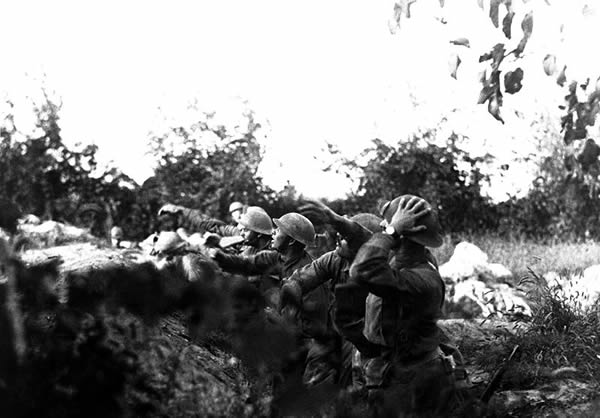The Danger of Disarmament and the Recipe for War
Marjorie Haun /

American soldiers on the Piave front hurling a shower of hand grenades into the Austrian trenches in World War I.
World War I had killed millions, and in its aftermath, the great nations of the world were in an arms race that was alarming and unprecedented. As international tensions rose, disarmament was regarded as the most effective way to curtail the potential outbreak of another large-scale war.
The Secretary of State called leaders of the major world powers to Washington, D.C., to discuss multilateral weapons reductions. Through a number of security agreements that obligated the five nations involved to participate in arms limitations programs, the participating nations might avoid another catastrophic war in the regions where conflict was most likely. While most of the signatories abided by the terms set forth in the “Disarmament Conference,” one did not. And though a small country with limited resources, the backslider would within years become brazenly militaristic—a global threat that, in the wake of the disarmament conference, would threaten to overpower other nations which had voluntarily curbed many of their own defensive capabilities.
This scenario does not involve the current Secretary of State or contemporary saber-rattlers such as Iran and North Korea. This scenario is from 90 years ago, and the militaristic country that eventually rejected the terms of the arms limitation treaties of 1922 was Japan. If there were a recipe book handed down from prior generations that listed the ingredients for war, “disarmament” would be at the top of the list.
Dr. Keith B. Payne addresses this “past is prologue” notion in an article in The Weekly Standard of April 9–16. Payne cites the words of George Kennan, the man who devised Cold War policy during the Truman years. Kennan called the post–World War I notion that disarmament would serve to prevent future wars “a species of wishful thinking and a vapid distraction from the serious business of responding to the international threats that culminated in World War II.” One easily imagines the “vapid” ideas that have emanated from the Obama Administration, from the ineffective New START Treaty to the suicidal doctrine of “Nuclear Zero.”
In his article titled “Nuclear Utopianism: The wishful thinking of U.S. arms control,” Payne compares the explosive nature of today’s international tensions to those circumstances that climaxed in World War II. Payne cites Russia’s recent statements that the United States is its primary military foe. He explores the unsettling reality that China is steadily improving and expanding its nuclear programs. He notes that North Korea continues to flaunt its willingness to strike at the West with nuclear weapons. Payne recounts Iran’s open declarations that Israel and the United States are targets for annihilation. And he advances the potential for future nuclear cataclysm presented by Pakistan, which has long been beset with national instability.
The Obama Administration’s “wishful thinking” takes a variety of forms, according to Payne. The assertion that nuclear arms are being reduced by the New START Treaty is promoted by what he calls “contrived counting,” which fails to account for whole classes of nuclear weapons. The differences between strategic and tactical nuclear weapons are glossed over, and it is very likely that Russia omits thousands of tactical nuclear weapons from its counts. A treaty designed to make inventory-taking central to a plan for keeping the world safe from nuclear war is just one example of the delusional utopianism to which Payne refers in his incisive article.
The dogma of “Nuclear Zero” that has come out of our own State Department amounts to a complete dismantling of America’s nuclear arsenal, with the utopian hope that the other nations of the world—rogue aggressors included—will happily follow our good example.
The Obama Administration, in what amounts to unilateral arms reduction, is using the same ingredients that, 90 years ago, would prove to create an explosive dish called World War II. The ingredients for disaster are amassed, and it appears that Barack Obama, with his “nuclear utopianism,” is just the chef to pull it off. It is clear in Payne’s article that instead of shrinking our nuclear arsenal, the United States should be improving and expanding it. Instead of using toothless treaties to govern multilateral disarmament processes, the United States should shore up its battle readiness and its defensive shields.
The United States should display military strength that only the most foolish regimes would challenge. Payne closes his article with an additional quote from George Kennan which, for the Obama Administration, bears a powerful cautionary message: “The evil of these utopian enthusiasms was not only, or even primarily, the wasted time, the misplaced emphasis, the encouragement of false hopes. The evil lay primarily in the fact that these enthusiasms distracted our gaze from the real things that were happening.”
Marjorie Haun is a guest blogger. The views expressed by guest bloggers on the Foundry do not necessarily reflect the views of the Heritage Foundation.
